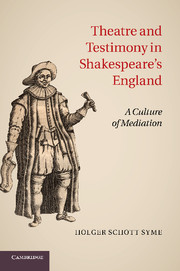Book contents
- Frontmatter
- Contents
- Illustrations
- Acknowledgments
- Textual note
- Abbreviations
- Introduction: The authenticity of mediation
- Chapter 1 Trial representations
- Chapter 2 Judicial digest
- Chapter 3 Performance anxiety
- Chapter 4 Royal depositions
- Chapter 5 The reporter’s presence
- Epilogue: The theatre of the twice-told tale
- Select bibliography
- Index
- References
Chapter 3 - Performance anxiety
bringing scripts to life in court and on stage
Published online by Cambridge University Press: 05 March 2012
- Frontmatter
- Contents
- Illustrations
- Acknowledgments
- Textual note
- Abbreviations
- Introduction: The authenticity of mediation
- Chapter 1 Trial representations
- Chapter 2 Judicial digest
- Chapter 3 Performance anxiety
- Chapter 4 Royal depositions
- Chapter 5 The reporter’s presence
- Epilogue: The theatre of the twice-told tale
- Select bibliography
- Index
- References
Summary
In Robert Greene’s romance Francescos Fortunes a fictitious Cicero lectures an equally imaginary Roscius on the subject of the relative authority of actor and writer. ‘Of thy selfe’, Cicero tells him, ‘thou canst say nothing. [W]hat sentence thou utterest on the stage, flowes from the censure of our wittes; and what sentence or conceipte of the invention the people applaud for excellent, that comes from the secrets of our knowledge.’ Roscius responds, appropriately, with silence. From Greene’s perspective – expressed through Cicero – actors are dumb creatures, capable merely of the ‘mechanical labour’ of ‘action’ (i.e., gesture), given voice by the wits of playwrights, and ignorant of the craft that produces ‘sentence[s] or conceipt[s]’ worthy of public acclaim. And yet Rome’s dramatists needed Roscius, just as Greene needed, say, John Bentley (a famous tragedian appropriately remembered by Thomas Dekker as a ‘Player, molded out of [poets’] Pennes’), as Marlowe needed Alleyn, and as Shakespeare needed Burbage. The actor figured as utterly dependent ventriloquist’s puppet whose physical presence, most notably in the form of ‘action’, was nevertheless an indispensable medium of transmission for the written word corresponds closely to the court clerk reading – and thereby channelling – depositions during a trial. In this chapter, I will investigate the cultural conditions that underlay this analogy. As we will see, Greene’s image of actors as ‘Puppets . . . that spake from our mouths’, with its strangely contorted logic of embodiment and possession (how do the players’ mouths become the playwright’s? who is the agent, the speaker or the mouth’s owner?) reflects the mutual deferral of actor to dramatist and dramatist to actor, but also hints at a metaphorics of demonianism which recurred throughout the period. Actors were imagined as possessed by their authors’ writ, controlled by foreign tongues – and as I will argue, a similar understanding underpinned the legal performances I have discussed in the preceding chapters. In what follows, I will analyse a series of metaphors, anecdotes, and plays to trace the ways in which the relative authorities of texts and speakers were understood by different institutions and authors as they positioned themselves within (or on the fringes of) the culture of mediation.
- Type
- Chapter
- Information
- Theatre and Testimony in Shakespeare's EnglandA Culture of Mediation, pp. 111 - 152Publisher: Cambridge University PressPrint publication year: 2011



